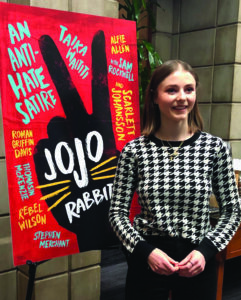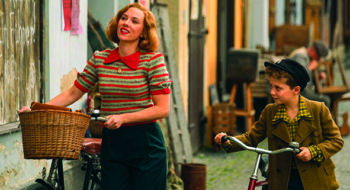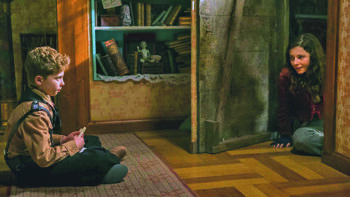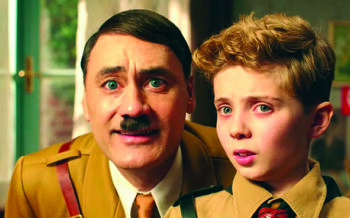Have a Great Knowledge of the Human Heart
A Prayerful Reflection
with the Movie Jojo Rabbit
Jojo Rabbit, directed by Taika Waititi, is a challenging film on many levels.
Winner of the Academy Award this year for Best Adapted Screenplay (and nominated in five other categories) and winner of the People’s Choice Award at the 2019 Toronto International Film Festival, it has also been called “bland and misjudged” (Peter Bradshaw, The Guardian) – and that would be one of the milder criticisms. It is very much a movie that has divided critics around the world.
Part of the challenge lies in the film’s subject matter – Hitler and the Nazis – and part of the challenge lies in the fact that it is a satire: and humour, in whatever format, is always divisive because appreciation of it lies in what the viewer considers to be funny (in this case, satirical) rather than objectively in the subject matter or the way it is treated.
And a significant part of the challenge of the movie lies in the fact that it doesn’t allow its audience to remain unengaged but rather demands responses on a number of levels including the intellectual and the emotional.
Based loosely (and tonally very differently) on Christine Leunens’ 2008 novel ‘Caging Skies’, Jojo Rabbit is set in the closing stages of World War II.
It centres around a 10-year-old, Johannes (Jojo) Betzler who struggles to participate totally enthusiastically in all aspects of ‘entertainment’ at a Hitler Youth Special Training Weekend. The command that finally breaks Jojo’s resolve is to kill a rabbit – something he is unable to do (and so he is mockingly given the name Jojo Rabbit).
He finds comfort in talking to his imaginary best friend, Adolf Hitler (played by Waititi) and strengthened in his desire to serve the Fuhrer he returns to the group and seizes a grenade – but the only damage done is to himself when it explodes.
Effectively invalided out of the Camp, Jojo – at his mother’s (Scarlett Johansson) insistence -finds himself working for the Camp co-ordinator, Captain Klenzendorf (Sam Rockwell), doing such things as distributing propaganda pamphlets.
But with spare time on his hands because he can’t join others in the Hitler Youth in training, Jojo is home alone more and more. And it is while he is there one day that he discovers his mother’s secret – that she is hiding a Jewish girl, Elsa, (Thomasin McKenzie) in a secret place in the house.
His mother retains her faith in the essential goodness of her son – despite his apparent enthusiasms for fascist beliefs – and tells him “Love is the strongest thing in the world”.
And so Jojo’s real growth begins.
That’s the subject matter of the film – it’s how Waititi deals with it that particularly presents challenges.
Those familiar with his work (Thor: Ragnarok, Hunt for the Wilderpeople, Boy, What We Do in the Shadows) will be aware that his is a very personalised view of the world. They will also know that humour is his preferred form of expression.
Possibly New Zealanders find Waititi’s sense of humour easier to relate to – but his artistic expression is much more than localised to the South Pacific. As well as being of Maori origin, Waititi is also of Jewish descent - and that combination allows him a particularly unique approach to what is, inevitably, highly sensitive subject matter.
Is it permissible – or acceptable – to treat Hitler as a complete idiot not to be taken seriously and to immediately ridicule the Nazis from the opening of the film by beginning with the sounds of the Beatles singing a German cover of “I Wanna Hold Your Hand” as a backdrop to thousands of Nazis saluting the Fuhrer?
Waititi, of course, is not the first director to adopt a “different” approach to the horrors of Nazism. Mel Brooks (The Producers), Quentin Tarantino (Inglourious Basterds), Roberto Benigni (Life is Beautiful), to name a few, have all tried ‘alternative’ portrayals with varying reactions amongst audiences and critics.
We know of Hitler’s evil and that of the Nazis – but can we view them in any way other than with horror and revulsion?
Waititi would suggest that not only can we, but we must: “We have to find new and inventive ways to tell the story and to move forward with love.” (cf Stuff, 16 September 2019)
That is the core challenge put to the audience when viewing and reflecting on Jojo Rabbit. And it is a challenge that we can approach in a particularly Marist way.
A key concept for Jean-Claude Colin in forming his Marists was “Have a great knowledge of the human heart and find the key to the human heart. You must win people’s esteem, and their heart, in order to win them over”.
We are all aware of the truth of that admonition – we’ve seen it over the years in our ministries and in our experiences. In one way or another, if we live long enough we come to see the truth that more people are won over by love and understanding than they are by rational arguments alone.
But there is a deeper truth behind what the Founder is saying than only what we have witnessed or experienced in our dealings with others.
The first – and essential – heart that we must have a great knowledge of is our own.
How open is our own heart to the 'new'? How much are we willing to risk in order to move forward with love? How much have we closed down in our heart because of past hurts and losses? How defensive have we become in order to protect our heart from further pain or from our fears? How much do we live only out of our intellect rather than also out of our heart?
In terms of the movie, this is where Jojo is taken as he interacts with his mother, with his friend Yorki (Archie Yates), with Elsa, with Captain Klenzendorf, his 'formator' in Nazi youth camp, and with his imaginary friend, Hitler.
Over the course of the movie, Jojo changes and grows in how he views his world and the people who inhabit it – “The parallel between the imaginary friend who is actually a monster and the girl he’s been told is a monster but is actually a friend ...” (Brian Tallerico, Roger Ebert.com, 18 October 2019).
And so amidst all the questions Jojo Rabbit poses is a key one for Marists: How willing are we to explore our own heart and to have a great knowledge of it? Like viewing and reflecting on Jojo Rabbit, it is challenging – perhaps even frightening – territory to venture into. But it will also allow us to find new ways of telling the story of our life and to move forward in love.




 Entries(RSS)
Entries(RSS)